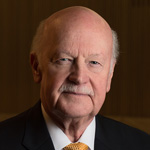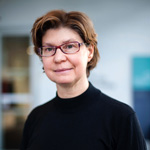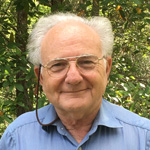Three Academy Fellows, including Academy President John Shine, have been newly elected to the Royal Society, the world’s oldest scientific academy in continuous existence.
They are among 62 individuals worldwide who have been recognised for their outstanding contributions to scientific understanding.
Past Fellows and Foreign Members of the Royal Society have included Isaac Newton, Charles Darwin, Albert Einstein, Dorothy Hodgkin and Stephen Hawking.
Dr Venki Ramakrishnan, President of the Royal Society, said at this time of global crisis, the importance of scientific thinking, and the medicines, technologies and insights it delivers, has never been clearer.
“Our Fellows and Foreign Members are central to the mission of the Royal Society, to use science for the benefit of humanity,” said Dr Ramakrishnan.
The Fellowship of the Royal Society are the most eminent scientists, engineers and technologists from or living and working in the UK and the Commonwealth. Each year up to 52 Fellows and up to 10 Foreign Members are elected from a group of about 700 candidates.
Professor John Shine

What does it mean to be elected a Fellow of the Royal Society?
“It’s obviously an honour to join such an illustrious group of scientists. Recognition by your peers is always special. Science is critical to finding real and lasting solutions to all challenges to humanity-whether it be acute, like infectious disease pandemics, or more longer term like climate change and environmental pollution.”
Are there any Fellows of the Royal Society who have been a particular source of inspiration for you?
“All of them and what they stand for-the pursuit of knowledge for the betterment of humanity, as with the Australian Academy-but in particular Australians such as Suzanne Cory, Jerry Adams, Gus Nossal and Jim Peacock who are world leaders in fields close to my direct interests.”
Professor Shine is a leading figure in the molecular biology of gene structure and expression and its application to medicine. He has made major contributions to the development of recombinant DNA technology, both in Australia and internationally. He was the first to clone a human hormone gene and was a central figure in cloning the first mammalian genes, insulin and growth hormone. He was the first to demonstrate that human genes cloned in bacteria could be expressed in a biologically active form and, more recently, has made major contributions to evolving concepts of the structure and function of receptor families.
Professor Jane Visvader

What does it mean to be elected a Fellow of the Royal Society?
“Discoveries made by Fellows of the Royal Society have played such a transformative role in society. It is truly humbling to be joining such an esteemed list of scientists, dating back to the 1600’s. It is wonderful to be recognised by scientific peers for my contributions in my own research area, which is aimed at delivering better outcomes for women with breast cancer. I hope that my election will provide some inspiration to early-career scientists, especially women. Election does come with a responsibility to help promote science and convey the importance of science to shaping a better society.”
Why does science matter, particularly at a time when we are dealing with the COVID-19 crisis?
“More than ever, this pandemic underscores how dependent our society is on basic and applied science. The biological sciences have always been pivotal to understanding the basis for disease and pinpointing effective therapies. The COVID-19 crisis reminds us how important the scientific method is for understanding the basis of diseases, climate change and the long list of issues that have global relevance.”
Are there any Fellows of the Royal Society who have been a particular source of inspiration for you?
“I’m a strong believer that scientific rewards come from hard work, perseverance and a passion for discovery. Mentors also play an important role. I have been fortunate to have had many wonderful mentors over the years, most recently Jerry Adams and Suzanne Cory, both Fellows of the Royal Society, who have helped shape my career. In turn, one of the things I’m most proud of is that I have had the opportunity to supervise many talented scientists who have gone on to become successful independent researchers. The majority of these have been women.”
Professor Visvader is a leading Australian molecular and cellular biologist who has greatly clarified breast development and the role of stem cell biology in breast cancer. In a remarkable discovery, her team identified and isolated the stem cell that generates the entire breast. Her work also defined the cellular hierarchy within the breast, identified master regulators that orchestrate its differentiation program, and discovered that certain types of breast cancer originate from specific progenitor cells. The results of her research have profound implications for understanding the cellular origins of both normal and cancerous epithelial tissues.
Professor John Endler

What does it mean to be elected a Fellow of the Royal Society?
“To me it is a very high honour indeed! I never expected to be elected, my only life goal has always been to be a happy zoologist! Just amazing! This is also very good news for my scientific fields: the interface among behavioural ecology, evolutionary ecology, sensory ecology, ecology and evolution.”
What inspired you to pursue this path?
“Pure curiosity! Also curiosity about the why, rather than just the usual who (taxonomy), what, where, and how. [Science] is the only way to obtain objective reality; science is explicitly designed to remove bias and get at the facts and actual reality. Everything else is pure self-serving opinion. And a lot of opinion is harmful and at best unproductive.”
Are there any Fellows of the Royal Society who have been a particular source of inspiration for you?
“Yes, Nick Davies. He is unique in making major use of first-class natural history to generate testable hypotheses and test them. In the current rush to get grants and publish, most other people have forgotten that the ultimate source of new hypotheses and new insights comes from natural history. Without that fields get bogged down and answering-or not answering-the same old questions in the same old, often unproductive, ways. Novelty and good hypotheses depend upon natural history which means keen and careful observation of natural phenomena. This applies to any field, not just mine.”
Professor Endler is widely held as one of the world’s leading evolutionary biologists. He was instrumental in showing how geographically varying elements can cause divergent evolution and speciation, despite significant gene flow. His experimental evolution studies of sexual seduction and natural selection on colour patterns of guppies were groundbreaking, and his demonstration of the modes and strength of selection in the wild has spawned a generation of research into selection in natural populations. His work on colour vision has revolutionised our understanding of how animals perceive the world, and he has pioneered the new science of sensory ecology.








